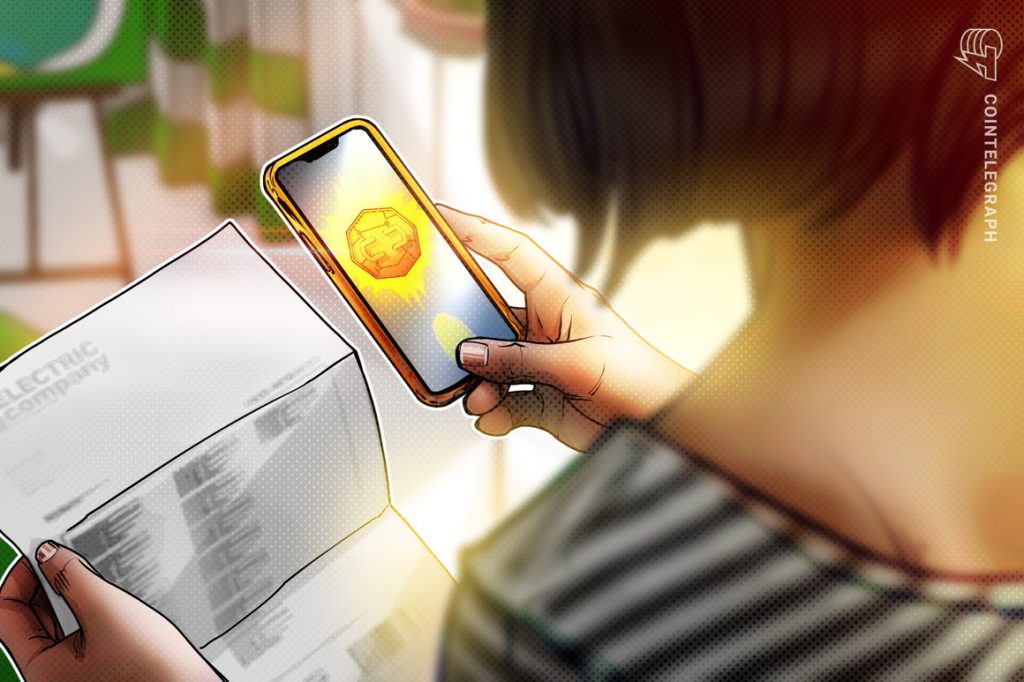How to pay your bills with cryptocurrency?

Satoshi Nakamoto developed the first decentralized cryptocurrency called Bitcoin (BTC) and referred to it as “a peer-to-peer electronic cash system.” As per Bitcoin’s white paper, online payments could be made directly from one party to another without going through a banking institution with a peer-to-peer version of electronic cash.
That said, other than using Bitcoin as an investment vehicle or a store of value, it can be used to pay for goods and services. Similarly, other cryptocurrencies like Dogecoin (DOGE) can be used to pay bills online with crypto.
This article will discuss how to pay in cryptocurrency, how to spend Bitcoin on day-to-day purchases and various ways to utilize your cryptocurrencies to pay your cell phone, gas or groceries bills.
How to make a payment with cryptocurrency?
Firstly, one needs to acquire a crypto asset like Bitcoin to begin paying with cryptocurrency. Exchanges like Coinbase and Binance allow users to exchange fiat for currency (or vice-versa) and store their private keys safely. However, self-custody might be an alternative if you don’t trust third parties for your private keys.
The next step is to sign up for a wallet of your choice to pay your bills straight from your crypto wallet. From hardware to software and web to paper wallets, plenty of options are available to send payments in cryptocurrency. As mentioned above, cryptocurrency exchanges also offer wallets to store private keys on behalf of their users. However, ensure that the wallet you choose is compatible with the cryptocurrencies of your choice.
Finally, check with your utility provider to see whether you can use cryptocurrencies to pay your bills. With merchants’ growing adoption of blockchain technology, many businesses have already started accepting payments in cryptocurrencies. For instance, Amazon supports Cardano (ADA), BTC and Ether (ETH) payments. Using a payment processor (i.e., online crypto payment gateway) like BitPay, companies may open a business account and start receiving ETH through its application.
What bills can I pay with crypto?
Users can use cryptocurrencies to pay for their expenses, from mortgage or rental payments to phone, electricity and internet bills. For instance, they can use crypto debit cards offered by payment processors to convert cryptocurrency into fiat to pay their mortgage, as they may not be able to pay their rent or mortgage directly using cryptocurrencies because most banks do not yet accept them as payment methods.
Companies like AT&T allow customers to pay their mobile bills using cryptocurrencies. Similarly, some municipalities also begin accepting payments in BTC, ETH and others. In addition, one can pay for gym memberships, student loans, electricity and credit card bills directly from their crypto wallet or using a crypto debit card.
While choosing to pay in cryptocurrencies, checking if your jurisdiction of residence treats them legal is essential. For instance, Switzerland treats cryptocurrencies as an asset class, which means Swiss residents can transact in crypto. But, on the other hand, since 2019, China has formally outlawed cryptocurrency exchanges. That said, avoid transacting in cryptocurrencies if they are not considered a legitimate form of payment in your country.
Can you pay bills with Bitcoin?
Many businesses accept BTC as a payment method, including Microsoft, Wikipedia, Travala, Shopify.com and others. For instance, Xbox gift cards, which may be used to make purchases at the Microsoft Store online, on Windows and on Xbox, can be bought through Bitcoin platforms. There are a few different types of cryptocurrency-based payment methods to pay bills with crypto, as discussed in the sub-sections below:
Bitcoin debit cards
Bitcoin debit cards are just like bank-issued prepaid debit cards that can be loaded with cryptocurrency to pay bills. When using a Bitcoin card at a merchant’s location, stored BTC or other cryptocurrencies are converted to whatever fiat currency to complete crypto payments for shopping.
Furthermore, any fiat currency the card supports can be withdrawn from ATMs using a Bitcoin debit card. To apply for a Bitcoin debit card, users may need to create an account at an exchange that issues such cards and sign up for a digital wallet. In addition, users may need to undergo a Know Your Customer (KYC) verification process to comply with Anti-Money Laundering (AML) regulations.
So, where can you use a Bitcoin debit card? In collaboration with significant credit card services like Visa and Mastercard, Bitcoin debit cards are issued that can be used for both online and offline shopping. For instance, the Shift Bitcoin Debit Card enables users to link their existing accounts and make purchases wherever Visa is accepted, making spending BTC as simple as spending dollars and cents. Similarly, anywhere Mastercard is accepted, users can use the BitPay card to start paying their bills with crypto.
Furthermore, some cards support cryptocurrencies as well as fiat currencies and charge cardholders for converting BTC (or any cryptocurrency) to foreign fiat currency. Despite these privileges, this isn’t to say that Bitcoin debit cards are without disadvantages. For instance, cyberattack risks arise if funds are transferred from a wallet to a debit card service provider.
Bitcoin-powered bill pay services
In addition to Bitcoin debit cards, bill-pay companies like Coinsfer in the United States accept BTC to pay for subscriptions, bills, and products on behalf of their customers. Buyers need to send links to products they want to purchase using cryptocurrency, and then Coinsfer provides them with the full order cost (including shipping charges). After Bitcoin payment by the customers, Coinsfer pays for their order that they can track.
Direct Bitcoin payments
While shopping online or offline, ask the merchants if they accept BTC or read through their website to clarify. Various companies where one can pay via Bitcoin include Microsoft, Whole Foods, Overstock, Virgin Airlines and Save the Children, among others. Paying directly to the merchants that accept BTC eliminates conversion and service charges. Additionally, it reduces the steps one must go through if one chooses a bill pay service.
Furthermore, some states, such as Colorado in the United States, have started accepting BTC for tax payments via PayPal, allowing residents to make direct payments in Bitcoin. Also, after Bitcoin became a legal tender in El Salvador, McDonald’s and Starbucks started accepting BTC as a form of payment.
Advantages of using cryptocurrency to pay bills
Due to the pseudonymous feature of cryptocurrencies, one can manage their finances without government oversight. However, information can be made available via wallet address if users wish to do so. Moreover, one can directly pay their bills using cryptocurrencies (where they are acceptable) using a peer-to-peer blockchain network.
In addition, you only need an active internet connection to make payments in cryptocurrency anywhere in the world. Furthermore, unbanked or low-income people can receive crypto loans or make payments in BTC, ETH, DOGE and others at marketplaces that support cryptocurrencies.
Disadvantages of using cryptocurrency to pay bills
Blockchain networks charge transaction fees to receive and pay bills in crypto, and one may want to avoid such expenses. Moreover, cryptocurrencies are not regulated in some countries, which means if funds are lost, one cannot claim their money back. In addition, as cryptocurrencies are highly volatile, users may need to pay hefty bills if the prices rise or may not have enough crypto available if prices dwindle.
The private keys and seed phrase that provide access to users’ funds are their responsibility — if they misplace them, there is no way to get them back. In addition to losing your keys, the price decline of a cryptocurrency you hodled could result in financial loss. Moreover, a trade completed using cryptocurrencies cannot be undone since it is recorded into the blockchain except in scenarios like a mistake or error and the recipient willingly wants to transfer funds back.














